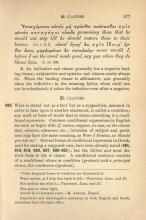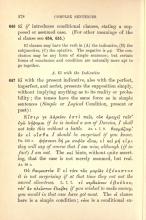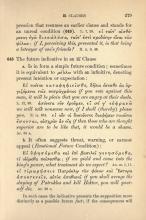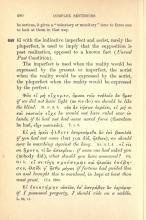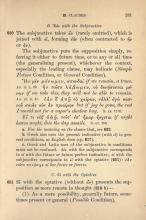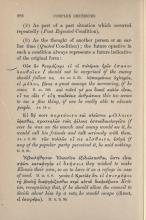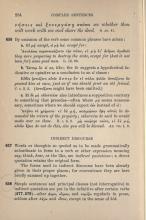645. What is stated not as a fact but as a supposition, assumed in order to base upon it another statement, is called a condition; any word or form of words that so states something is a conditional expression. Common conditional expressions in English are such as begin with if, unless, suppose, in case, on the chance that, whoever, whenever, etc.; inversion of subject and predicate may have the same meaning, as Were I Brutus, or Should you ask me.[fn]Other frequent forms of condition are illustrated in
What matter, so I help him back to life. —Tennyson, Lanc. and El.
Not without she wills it. —Tennyson, Lanc. and El.
Man gets no other light,
Search he a thousand years. —M. Arnold, Emped.
Imperative and interrogative sentences, in both English and Greek, sometimes have the same office.[/fn]
Several forms of conditional expression in Greek, used for stating a supposed case, have been already noted (§§ 481, 616, 618, 620, 627, 629, 630, 631); but the fullest and most distinct form is the εἰ clause. A conditional sentence consists of a conditional clause or condition (protasis) and a principal clause, the conclusion (apodosis).
646. Εἰ (if) introduces conditional clauses, stating a supposed or assumed case. (For other meanings of the εἰ clause see §§ 654 and 655 below.)
Εἰ clauses may have the verb in (a)the indicative (b)the subjunctive or (c) the optative. The negative is μή. The conclusion may be any form of simple sentence; but certain forms of conclusion and condition are naturally more apt to go together.
647. Εἰ with the present indicative, also with the perfect, imperfect, and aorist, presents the supposition simply, without implying anything as to its reality or probability; the tenses have the same force as in simple sentences (Simple or Logical Condition, present or past).
Εἴπερ γε Δᾱρείου ἐστὶ παῖς, οὐκ ἀμαχεῖ ταῦτʼ ἐγὼ λήψομαι.
If he is indeed a son of Dareios, I shall not take this without a battle.
Xen. Anabasis 1.7.9
θαυμάζοιμʼ ἂν εἰ οἶσθα.
I should be surprised if you know.
Plato Protagoras 312c
φήσουσι δή με σοφὸν εἶναι, εἰ καὶ μή εἰμι.
They will say of course that I am wise, although (if in fact) I am not.
Plato Apology 38c
The καί hints, without quite asserting, that the case is not merely assumed, but real.
Oὐ θαυμαστὸν δʼ εἰ τότε τᾱ̀ς μορίᾱς ἐξέκοπτον.
It is not surprising if at that time they cut out the sacred olive-trees.
Lysias 7.7
εἰ κερδαίνειν ἐβούλου, τότʼ ἂν πλεῖστον ἔλαβες.
If you wished to make money, you would in that case have got most.
Lysias 7.20–21
The εἰ clause here is a simple condition; τότε is a conditional expression that resumes an earlier clause and stands for an unreal condition (§ 649, below).
εἰ ταῦτʼ αἰσθόμενος ἐγὼ διεκώλῡσα, ταῦτʼ ἐστὶ προδότην εἶναι τῶν φίλων;
If I, perceiving this, prevented it, is that being a betrayer of ones friends?
Xen. Hellenica 2.3.46
648. The future indicative in an Εἰ Clause
a. Is in form a simple future condition; sometimes it is equivalent to μέλλω with an infinitive, denoting present intention or expectation.
Eἰ τούτου καταψηφιεῖσθε, δῆλοι ἔσεσθε ὡς ὀργιζόμενοι τοῖς πεπρᾱγμένοις.
If you vote against this man, it will be plain that you are angry at their deeds.
Lysias 12.90
ἀσύνετα νῦν ἐροῦμεν, εἴ σέ γʼ εὐφρανῶ.
We will talk nonsense now, if I shall (thereby) please you.
Eur. Iphigenia in Aulis 654
εἰ οὖν οἱ δοκοῦντες διαφέρειν τοιοῦτοι ἔσονται, αἰσχρὸν ἂν εἴη.
If then those who are thought superior are to be like that, it would be a shame.
Plato Apology 35a
b. It often suggests threat, warning, or earnest appeal (Emotional Future Condition).
Εἰ ὑφησόμεθα καὶ ἐπὶ βασιλεῖ γενησόμεθα, τί οἰόμεθα πείσεσθαι;
If we yield and come into the kingʼs power, what treatment do we expect?
Xen. Anabasis 3.1.17
εἰ τῑμωρήσεις Πατρόκλῳ τὸν φόνον καὶ Ἕκτορα ἀποκτενεῖς, αὐτὸς ἀποθανεῖ.
If you shall avenge the slaying of Patroklos and kill Hector, you will yourself die.
Plato Apology 28c
In such cases the indicative presents the supposition more distinctly as a possible future fact; if the consequences will be serious, it gives a "minatory or monitory" tone to force one to look at them in that way.
649. Εἰ with the indicative imperfect and aorist, rarely the pluperfect, is used to imply that the supposition is past realization, opposed to a known fact (Unreal Past Condition). The imperfect is used when the reality would be expressed by the present or imperfect, the aorist when the reality would be expressed by the aorist, the pluperfect when the reality would be expressed by the perfect.
Φῶς εἰ μὴ εἴχομεν, ὅμοιοι τοῖς τυφλοῖς ἂν ἦμεν.
If we did not have light (as we do) we should be like the blind.
Xen. Memorabilia 4.3.3
οὐκ ἂν νήσων ἐκράτει, εἰ μή τι καὶ ναυτικὸν εἶχεν.
He would not have ruled over islands, if he had not had some naval force (therefore he had, εἶχε ναυτικόν).
Thucydides 1.9.4
Eἱ μὴ ῡ̔μεῖς ἤλθετε ἐπορευόμεθα ἂν ἐπὶ βασιλέᾱ.
If you had not come (but you did, ἤλθετε), we should now be marching against the king.
Xen. Anabasis 2.1.4
εἴ τίς σε ἤρετο, τί ἂν ἀπεκρῑ́νω;
If some one had asked you (nobody did), what should you have answered?
Plato Protagoras 311–312b
εἴ σε τύχη προύπεμψε καὶ ἡλικίᾱς ἐπέβησεν, ἐλπίδι γʼ ἦσθα μέγας
if fortune had guided you on and brought you to manhood, in hope at least you were great
Corpus Inscriptionum Atticarum 2263
Εἰ ἐκεκτήμην οὐσίᾱν, ἐπʼ ἀστράβης ἂν ὠχούμην.
if I possessed property, I should ride on a saddle.
Lysias 24.11
650. The subjunctive takes ἄν (rarely omitted), which is joined with εἰ, forming ἐᾱ́ν (often contracted to ἤν or ᾱ̓́ν). The subjunctive puts the supposition simply, referring it either to future time, or to any or all time (the generalizing present), whichever the context, especially the leading clause, may indicate (Simple Future Condition, or General Condition).
Ἢν μὲν μένωμεν, σπονδαί
if we remain, a truce
Xen. Anabasis 2.1.22
ἢν τοῦτο λάβωμεν, οὐ δυνήσονται μένειν.
If we take this, they will not be able to remain.
Xen. Anabasis 3.4.41
ἐᾱ̀ν δʼ ἀπῇ τὸ χαίρειν, τᾱ̓́λλʼ ἐγὼ καπνοῦ σκιᾶς οὐκ ἂν πριαίμην.
But if joy be gone, the rest I would not for a vaporʼs shadow buy.
Soph. Antigone 1170
Eἴ τι νὺξ ἀφῇ, τοῦτʼ ἐπʼ ἦμαρ ἔρχται.
if night leaves aught, this the day assails.
Soph. Oedipus the King 197–198
a. For ἐᾱ́ν meaning on the chance that, see § 652 (below).
b. Greek also uses the present indicative (with εἶ) in general conditions, as English does (cp. § 617).
c. Greek and Latin uses of the subjunctive in conditions must not be confused. ἐᾱ́ν with the subjunctive corresponds to si with the future or future perfect indicative; si with the subjunctive corresponds to εἰ with the optative (§ 631).
ἐν τοῦτο ποιήσῃς = si hoc facies or feceris
651. Εἰ with the optative (without ἄν) presents the supposition as more remote in thought (§ 616.b):
1.As a mere possibility, generally future, sometimes present or general (Possible Condition),
2.As part of a past situation which occurred repeatedly (Past Repeated Condition)
3.As the thought of another person or an earlier time (Quoted Condition); the future optative in such a condition always represents a future indicative of the original form.
Oὐκ ἂν θαυμάζοιμι εἱ οἱ πολέμιοι ἡμῖν ἐπακολουθοῖεν.
I should not be surprised if the enemy should follow us.
Xen. Anabasis 3.2.35
λῡπουμένοις ὀχληρός, εἰ μόλοι, ξένος.
A guest annoys the sorrowing, if he come.
Eur. Alcestis 540
καὶ τοῦτό γέ μοι δοκεῖ καλὸν εἶναι, εἴ τις οἷός τʼ εἴη παιδεύειν ἀνθρώπους.
This too seems to me a fine thing, if one be really able to educate people.
Plato Apology 19e
Εἰ δή ποτε πορεύοιτο καὶ πλεῖστοι μέλλοιεν ὄψεσθαι, προσκαλῶν τοὺς φίλους ἐσπουδαιολογεῖτο.
If ever he was on the march and many would see it, he would call his friends and talk seriously with them.
Xen. Anabasis 1.9.28
τῶν πολλῶν εἴ τις αἴσθοιτο, ἐσγᾱ.
If any of the popular party perceived it, he said nothing.
Demosthenes 9.61
Ἐβουλήθησαν Ἐλευσῖνα ἐξιδιώσασθαι, ὥστε εἶναι σφίσι καταφυγὴν εἰ δεήσειε.
They wished to make Eleusis their own, so as to have it as a refuge in case of need.
Xen. Hellenica 2.4.8
γνοὺς ὁ Κριτίᾱς ὅτι εἰ ἐπιτρέψοι τῇ βουλῇ διαψηφίζεσθαι περὶ αὐτοῦ ἀναφεύξοιτο
Kritias, recognizing that, if he should allow the council to decide about him by a vote, he would escape (direct, εἰ ἐπιτρέψω)
Xen. Hellenica 2.3.50
a. Rarely εἰ with the optative expresses an unreal condition, as in Homer.
652. Ἐᾱ́ν with the subjunctive, and after a past tense εἰ with the optative, are sometimes to be translated on the chance that, in the hοpe that, if perchance; the future supposition of the ἐᾱ́ν or εἰ clause is a motive for the action of the leading clause.
Oὔκουν ἀτρέμʼ ἕξεις, ἤν τι καὶ χορδῆς λάβῃς;
Won't you keep quiet then, on the chance of getting some sausage too?
Aristoph. Frogs 339
πέμψαντες πρέσβεις, εἴ πως πείσειαν μὴ σφῶν πέρι νεωτερίζειν μηδέν
sending envoys, in hopes they might (if haply they might) induce them to make no innovations in regard to them.
Thucydides 1.58.1
653. Εἴτε . . . εἴτε and ἐᾱ́ν τε . . . ἐᾱ́ν τε (whether . . . or) introduce alternative conditions, with indicative, subjunctive, or optative:
Πάντως δήπου, ἐᾱ́ντε σὺ καὶ Ἄνυτος οὐ φῆτε ἐᾱ́ντε φῆτε.
It certainly is so, whether you and Anytos say no or say yes.
Plato Apology 25b
654. After expressions of wonder, indignation, and some other emotions, εἰ with the indicative is used to describe, in the milder form of a supposition, the fact that causes the emotion. In such clauses εἰ may sometimes be translated if, but oftener that.
Θαυμάζω δʼ ἔγωγε εἰ μηδεὶς ῡ̔μῶν μήτʼ ἐνθῡμεῖται μήτʼ ὀργίζεται.
But I am for my part surprised that no one of you bears it in mind or is angry.
Demosthenes 4.43
655. After expressions of doubt or inquiry, εἰ with the indicative (rarely ἐᾱ́ν with the subjunctive) becomes an indirect question. In such clauses εἰ (or ἐᾱ́ν) may sometimes be translated if, but more often whether.
Εἰ μὲν δὴ δίκαια ποιήσω οὐκ οἶδα.
Whether I shall be doing right I do not know.
Xen. Anabasis 1.3.5
εἰ ξυμπονήσεις καὶ ξυνεργάσῃ σκόπει.
See whether thou wilt work with me and share the deed.
Soph. Antigone 41
656. By omission of the verb some common phrases have arisen.
a. Εἰ μή (except), εἰ μὴ διά (except for).
Ἀπολέσαι παρεσκευάζοντο τὴν πόλιν, εἰ μὴ διʼ ἄνδρας ἀγαθούς.
They were preparing to destroy the state, except for (had it not been for) some good men.
Lysias 12.60
b. Ὥσπερ ἂν εἰ (as, like): the ἄν suggests a hypothetical indicative or optative as a conclusion to an εἰ clause.
Εὐθὺς ἠσπάζετο αὐτὸν ὥσπερ ἂν εἰ πάλαι φιλῶν ἀσπάζοιτο.
He greeted him at once, just as if one should greet an old friend.
Xen. Cyropaedia 1.3.2
(ἀσπάζοιτο might have been omitted.)
c. Εἰ δὲ μή (otherwise) also introduces a supposition contrary to something that precedes—often where μή seems unnecessary, sometimes where we should expect ἐᾱ́ν instead of εἰ.
Ἀπῄτει τὰ χρήματα· εἰ δὲ μή, πολεμήσειν ἔφη αὐτοῖς.
He demanded the return of the property; otherwise he said he would make war on them.
Xen. Hellenica 1.3.3
μὴ ποιήσῃς ταῦτα, εἰ δὲ μή, αἰτίᾱν ἕξεις.
Do not do this, else you will be blamed.
Xen. Anabasis 7.1.8

